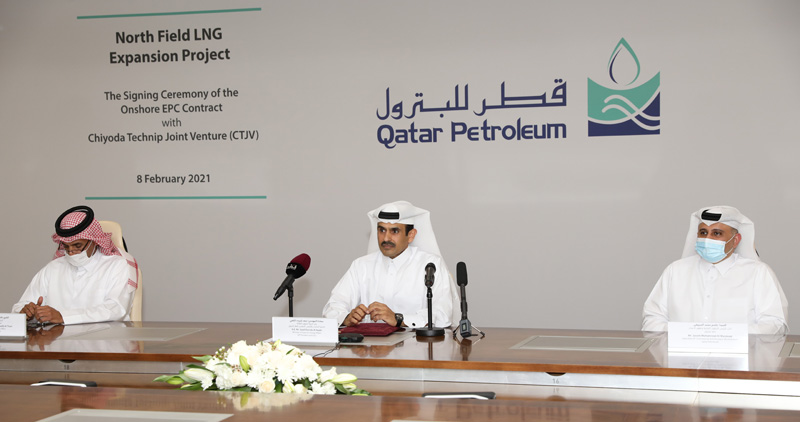
Qatar Petroleum (QP) has taken the final investment decision (FID) for the world’s largest LNG plant, which will increase the country’s production to 110 million tonnes per year.
Chiyoda and Technip will carry out the work on the North Field East (NFE) project. At the heart of the plan is the construction of four large LNG trains. These will have capacity of 8 million tonnes per year each. The state currently has capacity of 77mn tpy.
In addition to LNG production, the project will also recover condensate, LPG, ethane, sulphur and helium.
The project is due to begin producing in the fourth quarter of 2025. Total output will be around 1.4 million barrels of oil equivalent per day.
A signing ceremony was held on the execution of the onshore engineering, procurement and construction (EPC) contract. Attending were QP president and CEO Saad Sherida Al-Kaabi, Chiyoda chairman and CEO Kazushi Okawa and Technip Energies’ president Arnaud Pieton.
“The execution of this EPC contract marks the commencement of the construction of the [NFE] LNG project, and is a significant landmark in Qatar Petroleum’s strategic growth journey in a sustainable manner. The total cost of the NFE project will be $28.75 billion, making it one of the energy industry’s largest investments in the past few years, in addition to being the largest LNG capacity addition ever, and the most competitive LNG project in the world,” said Al-Kaabi.
“This project will generate substantial revenues for the state of Qatar and will have significant benefits to all sectors of the Qatari economy during the construction phase and beyond.”
The executive said the FID demonstrated Qatar’s commitment to “supply the world with the clean energy it needs”.
TechnipFMC acknowledged the contract win, saying that its CTJV joint venture with Chiyoda would execute the EPCC work.
Technip Energies’ Pieton said the company was honoured by the award. “It demonstrates the continuity and the strength of our joint venture after the successful delivery of the 6 existing mega LNG trains. This award reflects Technip Energies’ ability to integrate technologies towards low carbon LNG and supports our vision to accelerate the energy transition journey.”
Cleaning up
In line with QP’s focus on carbon capture and storage (CCS), the NFE work will be integrated into the Ras Laffan project. Once this is operational, it will be “the largest of its kind in terms of capacity in the LNG industry, and will be one of the largest ever developed anywhere in the world”, he said.
Qatar’s national grid will provide a substantial part of the project’s power needs. QP is procuring power commitments from an 800 MW solar park, under construction at Al-Kharsaah. The company is also planning to build its own 800 MW solar plant. This comes as part of its broader aim of having more than 4,000 MW of solar capacity by 2030.
QP will curb greenhouse gas (GHG) emissions by around 1mn tpy of CO2e through the use of a jetty boil-off system. The project will conserve 10.7 million cubic metres per year of water. This will come through the recovery of 75% of the plant’s tertiary water.
Further, it plans to use Dry Low NOx technology, which will reduce NOx emissions by 40%.
After NFE, the company also has plans for the North Field South (NFS) project. This will take the state’s liquefaction capacity from 110mn tpy to 126mn tpy. The NFS plan should start producing in 2027 and will involve two trains, each with capacity of 8mn tpy.
QP went on to hint that it may build more liquefaction capacity beyond the NFS plan.
Cost competitive
Wood Mackenzie’s global director of gas and LNG Giles Farrer predicted the NFE plan would be the largest sanctioned in the upstream this year.
“At a long-term breakeven price of just over $4 per million British thermal units, it’s right at the bottom of the global LNG cost curve, alongside Arctic Russian projects,” Farrer said. Qatar’s move would likely put pressure on other pre-FID projects.
“This focus on low-cost supply and carbon emissions is proving attractive to buyers. Last year, QP Trading won a tender to supply Pavilion Energy with 1.8 mmtpa of LNG under a 10- year contract, with specific provisions for assessing and measuring the emissions associated with each LNG cargo delivered.
“The award of the engineering, procurement and construction contract to Chiyoda and Technip is not a surprise given their historic involvement in the existing trains, but will be welcome news, particularly for Chiyoda, after some of its recent challenges building projects in the US and Indonesia.”
Updated on February 9, at 7:25 am with comments from Wood Mackenzie’s Giles Farrer.
Update 2 at 8:24 am with Technip comment.
